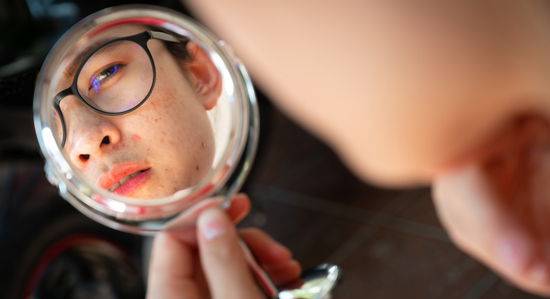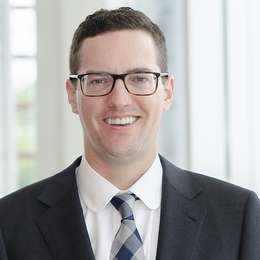
Nearly 85% of teens get acne at some point, making it a common coming of age experience. Many adults also experience breakouts, especially during times of stress.
Effective treatments for acne are out there. But different types of pimples, combined with unique skin types, can make choosing the right one feel overwhelming.
Dermatologist Ronald Sulewski, MD, has a decade of experience treating all kinds of acne. As the director of laser and aesthetic dermatology, Dr. Sulewski can speak to everything from over-the-counter products to prescription-strength topicals. He can also provide in-clinic services like laser scar removal, chemical peels and facial resurfacing.
Schedule a cosmetic consultation with a board-certified dermatologist at 800.922.0000.
Read on to discover four common over-the-counter treatments for acne: niacinamide, BHA, hydrocolloid bandages and benzoyl peroxide.
Niacinamide

Niacinamide is a form of vitamin B3. It works best for inflammatory acne (pimples that are red and swollen).
"I like niacinamide for a couple of different things. It has good anti-inflammatory properties, but the main thing is anti-redness," says Dr. Sulewski.
Niacinamide works in two ways to reduce:
- Redness of pimples
- Inflammation of big pimples or bumps
Niacinamide is a good product, but its availability might be limited. You might have issues finding a reliable brand that's also covered by insurance.
Beta hydroxy acid (salicylic acid)
BHA stands for beta hydroxy acid. It works best for noninflammatory acne (blackheads and whiteheads).
"Beta hydroxy comes in a couple different forms. One form is salicylic acid, which is the most common over-the-counter topical to treat acne," explains Dr. Sulewski.
Salicylic acid has anti-inflammatory properties – just like its chemical cousin, the common aspirin.
"There's also prescription strength salicylic acid, which can be 10 times the strength of over-the-counter versions," says Dr. Sulewski. "Salicylic acid chemical peels can treat an active acne breakout. A chemical peel also reduces acne scarring and pigmentation from past breakouts."
Hydrocolloid patches
Hydrocolloid bandages, also called pimple patches, are little stickers you can place directly over a zit. Some of these bandages are see-through and barely noticeable. Others draw more attention with bright, colorful shapes.
"We use hydrocolloid bandages frequently in wound healing," says Dr. Sulewski. "If you use one for acne, check if it includes salicylic acid, a common over-the-counter acne treatment."
Some online claims are likely exaggerated, like that the patches cause zero dryness or can make you zit-free overnight.
Benzoyl peroxide
Benzoyl peroxide is an ingredient in many facial cleansers, creams and gels. It works best for inflammatory acne – red bumps with pus inside. It's less effective for noninflammatory acne like whiteheads or blackheads.
"Benzoyl peroxide kills bacteria under the skin," says Dr. Sulewski. "It also removes excess oil and dead skin cells."
If you have sensitive skin, benzoyl peroxide can cause rashes or irritation. Avoid using it if you have eczema or psoriasis.
Some clinical-strength products are only available by prescription. Make a dermatology appointment at 800.922.0000 to discuss the best acne-fighting regimen for you.



